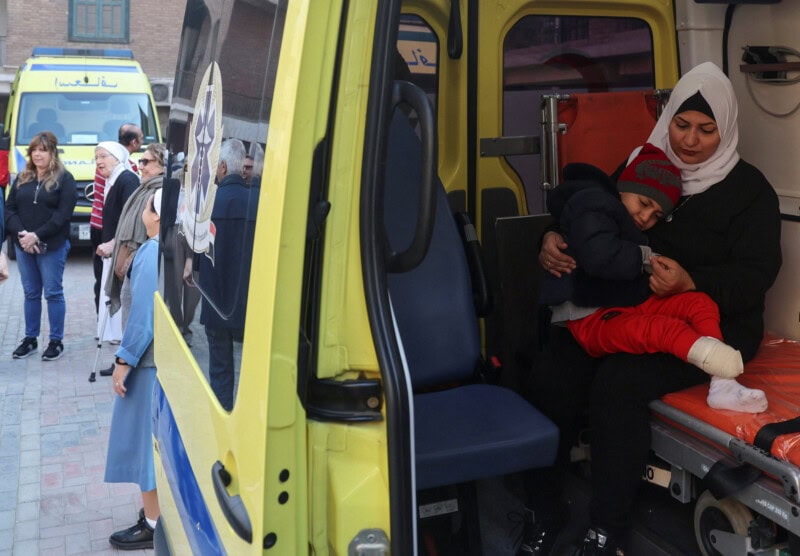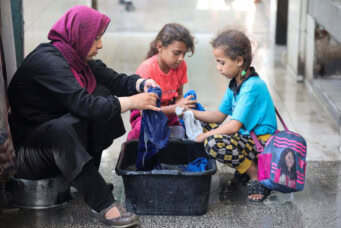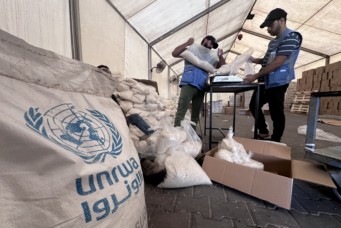Bridging Local and Global Assistance for Palestinian Refugees in Egypt
What happens to those who are beyond UNHCR and UNRWA’s scope of operation?

Shimaa, 10, a Palestinian girl who was evacuated from Gaza amid the ongoing war on Gaza cries with her aunt in an ambulance on their way to the airport, as wounded Palestinians are transported to Rome by military aircraft from Cairo International Airport, at the Italian hospital Umberto I of Cairo, Egypt February 9, 2024. REUTERS/Amr Abdallah Dalsh.
Palestinians are the only group of refugees excluded from the mandate of the main United Nations refugee agency as a result of the existence of two specialized bodies: one dedicated to the provision of services, and the other to find a solution to the Arab-Israeli conflict. But what happens to Palestinians in locations where both agencies do not operate?
The Statute of the Office of the United Nations High Commissioner for Refugees (UNHCR) was adopted by the UN General Assembly (UNGA) on December 14, 1950. The office was tasked with the mandate to help displaced populations after World War II. In 1951, the Convention Relating to the Status of Refugees was adopted. Article 35 of the convention requires the signatory states to cooperate with UNHCR, and gives the latter the responsibility to oversee the implementation of the convention.
The 1951 convention and its 1967 protocol represent the main legal instruments governing refugees around the world today, and form the basis of the UNHCR’s work. While its mandate was originally renewed every few years, in 2003 the UNGA made it permanent “until the refugee problem is solved”. It entails providing international protection and humanitarian assistance as well as working with the host governments to ensure the inclusion of refugees in national systems.
The only group that is excluded from UNHCR’s mandate is Palestinian refugees. The first paragraph of Article 1D of the Refugee Convention states:
“This Convention shall not apply to persons who are at present receiving from organs or agencies of the United Nations other than the United Nations High Commissioner for Refugees protection or assistance.”
At the time of drafting of the convention, two UN agencies were concerned with Palestinian refugees: the United Nations Relief and Work Agency for Palestine Refugees in the Near East (UNRWA) and the United Nations Conciliation Commission for Palestine (UNCCP). The former is tasked with the provision of aid and assistance to displaced Palestinians and the latter was created to find a solution to the Arab-Israeli conflict and ensure the protection of Palestinians refugees. Assigning two UN agencies to a specific refugee group is explained by the UN’s involvement in Palestine since 1945 and its partial responsibility for the expulsion of Palestinians as a result of the conflict following the Partition plan of UNGA Resolution 181(II). Palestinians were therefore automatically excluded from the Refugee Convention based on the provisions of Article 1D.
The UNCCP was mandated to facilitate an agreement between the Arab countries and Israel for the delineation of borders and the future of the West Bank, East Jerusalem, and the Gaza Strip that were under Arab control between 1948 and 1967. The UNGA also gave the UNCCP the responsibility of protecting the Holy Places, placing Jerusalem under an international regimen, ensuring the return of Palestinian refugees to their homes, and compensating them for the loss of, or damage to, their properties as a result of the war.
UNRWA was established in 1949 to provide short-term relief and humanitarian assistance. With the continuation of the conflict, UNRWA’s services expanded to include educational programs, health provision, social services, shelter and camp improvement, microfinance and microenterprise development programmes.
By the mid-1950s, it was obvious that the UNCCP failed to fulfill its mandate. The failure has been attributed to Israel’s opposition to the repatriation of Palestinian refugees and the lack of international political and financial support. While the agency has not been formally abolished, it became inactive.
The inactive status, legal scholars argue, should automatically revoke article 1D since the second paragraph of the Refugee Convention states the following:
“When such protection or assistance has ceased for any reason, without the position of such persons being definitively settled in accordance with the relevant resolutions adopted by the General Assembly of the United Nations, these persons shall ipso facto be entitled to the benefits of this Convention.”
As such, while the first paragraph acts as an ‘exclusion clause’, the second paragraph acts as a contingency ‘inclusion clause’.
UNHCR initially adopted a restrictive interpretation of article 1D of the 1951 convention ignoring the inclusionary paragraph. However, in 2002 and 2009 respectively, UNHCR issued two Notes on the Applicability of Article 1D of the 1951 Convention Relating to the Status of Refugees to Palestinian Refugees. In these notes, UNHCR affirmed that Palestinians refugees who were displaced in 1948 and 1967 are entitled to the benefits of the Convention as long as they reside outside UNRWA’s areas of operations.
UNRWA operates in five locations: Jordan, Lebanon, Syria, the Gaza Strip, and the West Bank including East Jerusalem. These locations are the ones that received the largest influx of Palestinians refugees after the 1948 and 1967 wars. Palestinians in these locations continue to be excluded from UNHCR’s services. However, it is worth noting that the above-mentioned three countries (Jordan, Lebanon, and Syria) are not signatories to the 1951 Convention.
In the above areas of its operations and given the inactive status of UNCCP, UNRWA is increasingly getting involved in protection-related issues. UNGA resolutions are increasingly using the language of ‘protection’ and ‘legal rights’ in relation to UNRWA’s role and activities. In 2010, UNRWA drafted a ‘Medium Term Strategy’ (MTS) for 2010 to 2015 designed to mainstream protection throughout its operations as an internal matter, and expand protection activities as an external matter. Moreover, following the Syrian conflict, it collaborated with UNHCR to assist Palestinian refugees who are fleeing to non-UNRWA operation fields.
Palestinian ‘Guests’ in Egypt
Egypt, a country on the border with Gaza, received far less Palestinians refugees since 1948. The Palestinian population in Egypt before the crisis starting October 7, 2023, was estimated to be no more than 75,000 scattered across fifteen Egyptian governorates.
Palestinians who fled to Egypt after the 1948 War amounted to around 11,000 to 13,000 individuals and were mostly hosted in camps in Qantara (northeast of Cairo) without any UN relief requested by Egypt. Moreover, Egypt did not request assistance from UNRWA. Instead, it transformed the Egyptian Higher Committee for Palestinian Immigrants, created to manage Palestinian refugees who arrived in Egypt between 1948 and 1950, into an aid agency. It classified Palestinians according to economic need and established eligibility criteria for assistance.
The reason why Egypt did not allow UNRWA to operate in the country was due to its desire to safeguard the Palestinian identity and allow their eventual return after the liberation of Palestine. It is argued that this same logic is what delayed Egypt from signing the 1951 Refugee Convention upon its adoption. Despite the fact that Palestinian refugees did not fall under the treaty, there was concern that signing a convention that ensures the right to asylum will eventually lead to the permanent settlement of Palestinians in the host countries and deny them the right to return to their homeland. Egypt signed the convention in 1981 but Jordan, Lebanon, Syria and all of the Gulf Cooperation Council (GCC) countries have not signed it to this day.
To facilitate the work of UNRWA in the Gaza Strip that came under Egypt’s administration in 1949, the government entered into an agreement with the body to open a liaison office in Cairo to establish the terms for its operation in Gaza. Under the agreement, UNRWA and its personnel were allowed freedom of movement inside Egypt and the Gaza Strip and between the two areas. In addition, the agency was exempted from customs duties and taxes on all goods imported into Gaza and its director as well as its advisory committee were provided with diplomatic immunity.
The 1967 War, however, produced the largest influx of Palestinians into Egypt. Many among them were 1948 refugees who were internally displaced in Gaza. Despite the large influx, Egypt did not change its position and continued to treat Palestinians as visitors and guests rather than refugees in order to prevent their permanent resettlement. The status of the UNRWA office in Egypt changed from a liaison office concerned with facilitating aid to Gaza to a representative office representing the agency in the League of Arab States. As such, the main role of UNRWA in Egypt is diplomatic in terms of building and maintaining relations with the Arab League and lobbying for the agency with the member states. UNRWA was and still is not allowed to operate in Egypt or engage in any operation-like activities.
However, as of 2011 and with the influx of Palestinian refugees from Syria to Egypt, who are estimated to be around 3,000, the agency was allowed to facilitate services only for Palestinians from Syria. Services are mostly in the area of health and medical care, which are facilitated through an agreement with the Egyptian Red Crescent (ERC).
Palestinians from Syria who register on UNRWA’s mobile application, eUNRWA, are eligible for primary and secondary health care services. UNRWA provides the list to the ERC which gives those in need of medical services authorization to access the health facilities of the Mostafa Mahmoud Clinic in Mohandessin, Cairo. Moreover, before the COVID-19 pandemic, Palestinians from Syria were provided with food coupons from the World Food Programme (WFP). After the pandemic and due to the new health regulations of maintaining distance, the service changed to a monthly cash payment equivalent to four-hundred-and-fifty Egyptian pounds ($23 at the time) that is transferred through a mobile application.
Civil Society Filling the Coverage Gap
There are no official statistics made public about the exact number of Palestinians who crossed into Egypt after the Israeli offensive on Gaza in October 2023. However, it has been estimated that from October 8 to March 31, around 100,000 left Gaza and entered Egypt and that on average 300-500 individuals leave Gaza to Egypt daily—including medical evacuees, dual nationals, and staff of international organizations. The exact number of those who stay in Egypt is not known. The exception is the students from Gaza studying in Egyptian universities who are estimated to be around 11,000. Moreover, the Ministry of Health declared in February 2024 that Egypt has received 44,065 Palestinian injured and cancer patients from Gaza since the start of the war.
Given the fact that the Egyptian government, for the reason explained above, is not authorizing UNHCR to deal with Palestinian refugees and UNRWA cannot engage in operational activities, aid to Palestinians in Egypt is provided by international and local non-governmental organizations as well as private donors.
The only local non-governmental organization authorized to assist the Egyptian government is the ERC and it is the entity that is mainly responsible for delivering aid to Palestinians in both Gaza and Egypt. At the beginning of the war, UNRWA facilitated the process of aid provision to Gaza. The office used to send a request to the Egyptian Ministry of Foreign Affairs to approve the entry of aid. However, according to UNRWA, the Egyptian government is now requesting that the crossing of aid should only be through the ERC.
With regard to the provision of aid to Palestinians in Egypt, the ERC, as mentioned above, is authorized to provide direct assistance. The work of other local and international organizations, however, is facilitated by the Palestinian embassy in Cairo and UNRWA. Palestinians in the locations where UNRWA is operating usually register in eUNRWA. If they approach the UNRWA office in Egypt upon arrival to the country, they are advised to change their residency from Gaza to Egypt on eUNRWA so the organization can inform the Palestinian embassy. However, there is no monitoring mechanism by which UNRWA ensures that they actually changed their residency.
Moreover, only those who approach UNRWA are requested to change their residency. As such, it is difficult to know the exact number of Palestinians who entered Egypt from Gaza. Those who do change their residency on eUNRWA are able to register with the embassy and can receive assistance from local and international organizations. Accordingly, the embassy monitors, organizes, and facilitates the process of aid provision to Palestinians from Gaza in Egypt. Save the Children and the Egyptian Food Bank have provided cash assistance in this way. UNRWA also works with medical cases coming from Gaza under the umbrella of the Egyptian Ministry of Health.
Some local organizations that provide assistance to refugees in Egypt do include Palestinian refugees as beneficiaries of their services. However, since most of these organizations are implementing partners to UNHCR, they cannot publicize their services to Palestinians given the fact that UNHCR is not authorized to include Palestinians in their services provision. For example, last year, one of these organizations provided entrepreneurship training to Palestinians from Syria living in female-headed households. Twenty-one women benefited from the training and were able to seek funds to start their small business at home.
Funding Cuts Have Far-Reaching Repercussions
In January 2024, Israeli authorities provided UNRWA with information about the alleged involvement of several UNRWA employees in the Hamas attacks of October 7. In response, UNRWA Commissioner-General Philippe Lazzarini terminated the contracts of these staff members and launched an investigation. Seventeen countries, including major donors, as well as the European Union, immediately suspended their UNRWA funding until further information is made available. Suspension is with regard to pledging new donations as countries are obliged to deliver what they already pledged.
In March 2024, several states resumed funding, including Sweden, Canada, Finland, Japan, France, and Australia, as well as the European Union. Germany resumed funding for all of UNRWA’s field of operations except Gaza until the investigations were completed, and in late April included Gaza after the Colonna Report indicated that Israel had failed to provide evidence of its claims over three months later. Most recently, Italy resumed funding, while the United States has not.
The disruption in funding at this critical time with the continuation of atrocities in Gaza represents a serious obstacle for UNRWA to continue with its emergency response in Gaza and its regional humanitarian operations. To compensate for the reduction in funds, the agency tried to mobilize public support and raise funds from private individuals and institutions through its fundraising activities. However, no matter how successful these fundraising activities are, they cannot compensate for the loss of funds from major donor countries like the United States.
UNRWA’s office in Egypt, as mentioned, is a representative office whose role is mostly diplomatic and does not provide direct funding to Palestinians residing in Egypt. However, the suspension of funding has negatively impacted the ability of the UNRWA office in Egypt to facilitate the mobilization of funds from its other offices to the international and local organizations in Egypt who can directly provide aid to Palestinians. The efforts of the Egyptian government and the local and international organizations operating in Egypt cannot be underestimated. However, without sustainable funding through an organized mechanism of aid delivery, Palestinians in Egypt will continue to suffer in the absence of UNHCR’s and UNRWA’s operational activities.
Maysa Ayoub is the Associate Director of the Center for Migration and Refugee Studies at the American University in Cairo. She has over 15 years of research and teaching experiences in the field of migration and refugee studies. She researched and published in the field on issues related to asylum policies, livelihoods of refugees, and public opinion and media attitude towards refugees and immigrants. Her PhD on Euro-Mediterranean issues is from the faculty of Economics and Political Science of Cairo University and her MA in Sociology is from the American University in Cairo.
Read More



